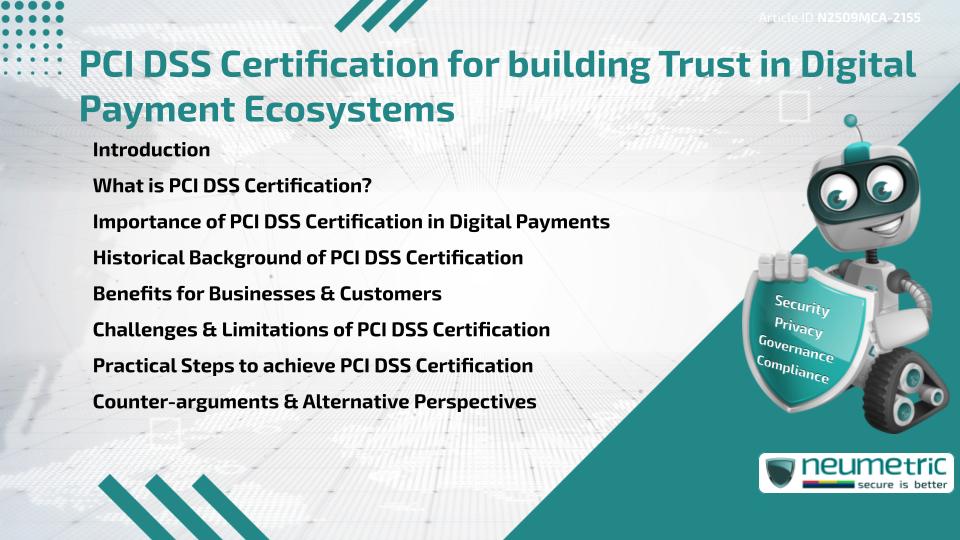Table of Contents
ToggleIntroduction
PCI DSS Certification plays a crucial role in securing Online Transactions & protecting Sensitive Customer Data. In today’s Digital-first world, businesses that accept, process or store Card Payments must comply with the Payment Card Industry Data Security Standard [PCI DSS]. This Certification reduces the Risks of Fraud, Boosts Customer Trust & Helps maintain a safe Digital Payment Ecosystem. Without such Standards, Customers face greater Risks of Breaches, while Businesses Risk losing Credibility & Financial Stability.
What is PCI DSS Certification?
PCI DSS Certification is a globally recognized Security Standard designed to Safeguard Cardholder Data. It applies to any Entity handling Payment Cards & Requires strict Compliance with Technical & Operational Security Measures. Think of it as a safety net that ensures both Businesses & Customers can engage in Digital Payments with confidence.
Importance of PCI DSS Certification in Digital Payments
Digital Payment Ecosystems thrive on Trust. Customers need assurance that their Card Data will not be exposed or misused. By obtaining PCI DSS Certification, businesses demonstrate a commitment to protecting Information, which fosters Long-term Relationships & Increases adoption of Digital Channels.
Historical Background of PCI DSS Certification
PCI DSS emerged in the early 2000s when leading Card Companies collaborated to address rising Incidents of Fraud & Cyber Theft. This Standard unified previously fragmented Security requirements into one structured Framework. Over time, it has evolved into a cornerstone of Digital Payment safety, setting a Benchmark across Industries.
Benefits for Businesses & Customers
For businesses, PCI DSS Certification ensures Compliance with Industry Standards, reduces the Risk of Costly Breaches & Enhances Brand Reputation. For Customers, it provides Peace of mind that their Data is secured during every Transaction. In essence, it is similar to locking a vault, both sides feel safer knowing the System is protected.
Challenges & Limitations of PCI DSS Certification
While effective, PCI DSS Certification is not without hurdles. Smaller businesses may find Compliance costly or complex & even Certified Organisations can still fall Victim to advanced Cyberattacks. Moreover, Certification alone cannot replace broader CyberSecurity Strategies.
Practical Steps to achieve PCI DSS Certification
Organisations seeking Certification typically follow steps such as assessing their Systems, fixing Vulnerabilities, completing required documentation & undergoing audits by Qualified Assessors. Commitment from leadership & consistent monitoring are Key to sustaining Compliance.
Counter-arguments & Alternative Perspectives
Some critics argue that PCI DSS Certification creates Additional expenses without completely eliminating Risks. Others suggest focusing on innovative Fraud Detection Tools alongside Compliance. Despite such viewpoints, PCI DSS Certification remains a widely trusted foundation of Payment Security.
Takeaways
PCI DSS Certification is more than just a Regulatory requirement, it is a commitment to safeguarding Trust in Digital Payment Ecosystems. Businesses that invest in Compliance not only protect Sensitive Data but also strengthen their relationships with Customers.
FAQ
What does PCI DSS Certification cover?
It covers Technical & Operational Standards for protecting Cardholder Data during processing, storage & transmission.
Who needs PCI DSS Certification?
Any organisation that stores, processes or transmits Card Payment Data must comply with PCI DSS Standards.
How often is PCI DSS Certification required?
Certification must be renewed Annually to ensure continuous Compliance with Security requirements.
Is PCI DSS Certification mandatory?
Yes, for businesses handling Payment Cards, it is a mandatory Industry requirement enforced by Card Brands & Payment Processors.
What happens if a business is not PCI DSS Certified?
Non-compliance can result in Fines, Higher Transaction Fees, Data Breaches & Loss of Customer Trust.
References
- PCI Security Standards Council
- NIST CyberSecurity Framework
- ISACA: Payment Security
- SANS Institute: Security Resources
- OWASP Foundation
Need help for Security, Privacy, Governance & VAPT?
Neumetric provides organisations the necessary help to achieve their CyberSecurity, Compliance, Governance, Privacy, Certifications & Pentesting needs.
Organisations & Businesses, specifically those which provide SaaS & AI Solutions in the Fintech, BFSI & other regulated sectors, usually need a CyberSecurity Partner for meeting & maintaining the ongoing Security & Privacy needs & requirements of their Enterprise Clients & Privacy conscious Customers.
SOC 2, ISO 27001, ISO 42001, NIST, HIPAA, HECVAT, EU GDPR are some of the Frameworks that are served by Fusion – a SaaS, multimodular, multitenant, centralised, automated, CyberSecurity & Compliance Management system.
Neumetric also provides Expert Services for technical Security which covers VAPT for Web Applications, APIs, iOS & Android Mobile Apps, Security Testing for AWS & other Cloud Environments & Cloud Infrastructure & other similar scopes.
Reach out to us by Email or filling out the Contact Form…


